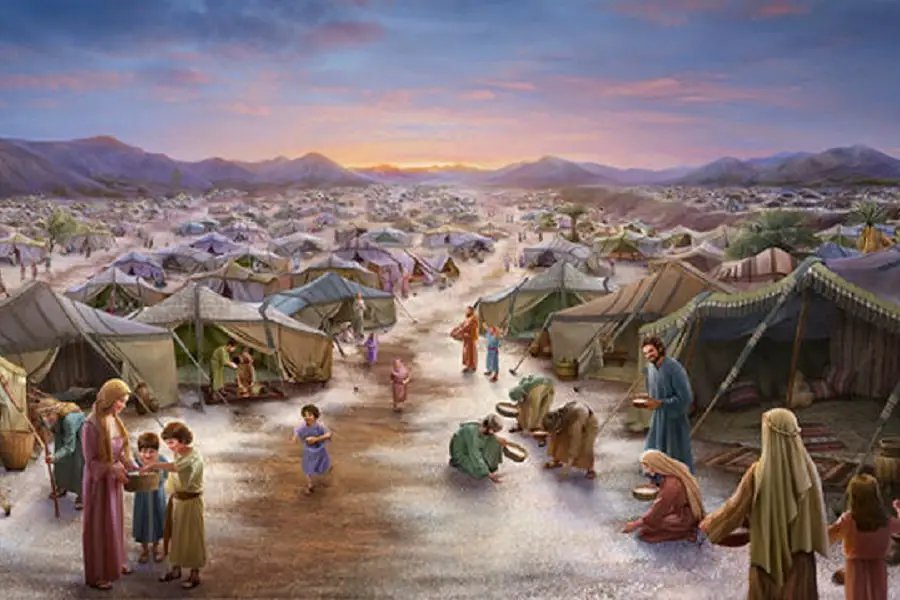
광야의 식탁을 즐기는 삶
저녁에는 메추라기가 와서 진에 덮이고 아침에는 이슬이 진 주위에 있더니 그 이슬이 마른 후에 광야 지면에 작고 둥글며 서리 같이 가는 것이 있는지라. (출애굽기 16:13-14)
6일 아침(낮)입니다.
메추라기와 만나는 광야에 식탁을 마련하신 하나님의 주 메뉴입니다. 메추라기는 이미 있는 재료를 활용한 것이었지만 만나는 전혀 새로운 신비의 식물, 기적의 음식이었습니다. 광야의 척박한 환경에서 하나님은 주야로 자기 백성을 돌보셨습니다. 밤은 더 이상 절망과 실패, 저주와 죽음의 이미지가 아니었습니다. 밤은 낮의 뒷모습이며 낮은 빛의 앞모습이었습니다. 만나의 결성 과정은 간단하지만 상세히 묘사되었습니다. 아침에 이슬이 내렸고 그 이슬이 마른 후에 작고 둥근 서리 모양의 결정체가 생겨났습니다. 햇빛에 스러지는 것이 고체이기보다 액체에 가깝습니다. 깟씨 같다 했으니 크기는 좁쌀알만 합니다. 일인당 한 오멜(2리터)씩 거두게 했으니 2리터들이 페트병을 생각하면 그 양을 대충 짐작할 수 있습니다.
만나는 이슬과 햇빛의 합성물입니다. 이것이 표현 그대로 기적의 식물이든지 고수풀(일반적으로 실란트로로 알려진 향신료로 일년생 허브임)의 씨앗이든지 어쨌든 하나님이 광야생활 동안 자기 백성의 주식으로 삼으신 은총의 방편입니다. 밤에 필요한 메추라기의 은혜와 더불어 아침에는 만나의 기적이 필요합니다. 그렇게 말씀 속에서 진정한 의미가 무엇인지를 묵상하며(만나란 이름 뜻이 바로 “이것이 무엇인가?”임) 시작하는 하루에 ‘맛 나는’ 만나의 실체가 삶의 언저리마다 차고 넘칠 것입니다.
“주님, 무엇을 제게 주시든지 아멘으로 받아들이게 하시되 “이것이 무엇입니까? 일일이 묻는 겸손함과 신중함을 허락하여 주시옵소서! 광야를 지나며 두렵지 않음은 주님이 예비하신 식탁이 곳곳에 마련되었기 때문입니다. 오늘 필요한 말씀이면 충분하옵니다. 오아시스가 있어 사막이 아름답듯 기족의 식탁으로 인해 광야는 은혜의 광장입니다.”
6. Life of enjoying the table in the wilderness
That evening quail came and covered the camp, and in the morning there was a layer of dew around the camp. When the dew was gone, thin flakes like frost on the ground appeared on the desert floor. (Exodus 16:13-14)
It's morning (daytime) on Day 6.
Quail is God's staple menu as he sets the table in the wilderness. The quail utilized ingredients they already had, but the manna was a whole new mystery plant, a miracle food. In the barren conditions of the wilderness, God cared for his people day and night. Night was no longer an image of despair and failure, curse and death. Night was the backside of day and the front side of daylight. The process of the formation of the manna was described in simple but detailed terms. There was dew in the morning, and after it dried, small, round, frost-like crystals formed. They were more like liquids than solids when exposed to sunlight. They were about the size of a grain of rice. Each person was allowed to harvest one omel (2 liters), so you can get a good idea of the volume if you think of 2 liters as a plastic bottle.
Manna is a composite of dew and sunlight; whether it's a literal miracle plant or the seeds of coriander (an annual herb with a spice commonly known as cilantro), it's a measure of grace that God made his people's staple food during their wilderness years. In addition to the grace of quail needed at night, we need the miracle of manna in the morning, so that the day we begin by meditating on what the Word really means (the very name of manna means "what is this?") will be filled with the reality of "savory" manna in every corner of our lives.
"Lord, whatever you give me, let me accept it with an Amen. But grant me the humility and prudence to ask, "What is this?" and to be careful. I will not be afraid as I walk through the wilderness, for there is a table prepared for me in every place; the word I need for today is sufficient. Just as the desert is beautiful because of the oasis, so the wilderness is a place of grace because of the tribal table."

정체성이 뚜렷해지는 삶
저녁 소제 드릴 때에 이르러 선지자 엘리야가 나아가서 말하되 아브라함과 이삭과 이스라엘의 하나님 여호와여 주께서 이스라엘 중에서 하나님이신 것과 내가 주의 종인 것과 내가 주의 말씀대로 이 모든 일을 행하는 것을 오늘 알게 하옵소서! (열왕기상 18:36)
6일 저녁(밤)입니다.
갈멜 산정에서의 대쟁투는 일방적인 싸움이었으나 시작 전부터 승패는 이미 갈려 있었습니다. 거짓 선지자 850명과 그들 편으로 기울어진 방관자의 무리들, 그리고 여호와를 위한 싸움에 홀로 나선 엘리야 선지자였습니다. 요란한 굿판이 끝났을 때까지 바알 쪽에서는 아무 일도 일어나지 않았습니다. 엘리야의 차례가 되자 그는 무너진 제단을 다시 쌓고 제물을 준비했습니다. 엘리야는 성급히 나서지 않고 ‘저녁 소제 드릴 때“까지 기다렸습니다.
이 시간은 유대인의 정시기도 시간인 제 삼시, 제 육시, 제 구시 중에서 마지막에 해당하며 오늘날의 기준으로 보면 오후 3시에 해당합니다. 하루의 마지막 기도 시간까지 엘리야는 기다렸습니다. 초조를 죽이고 조급을 장사지낸 뒤에 기다렸습니다. 하나님의 하나님 되심과 종의 종 됨을 나타내줄 것을 간청했습니다. 그 기도는 엘리야의 이름 뜻 그대로 ”하나님은 여호와“이심과 자신이 그분의 ’종중의 종‘임을 드러내는 것이었습니다. 모든 것을 완벽하게 준비한 후에도 기다릴 줄 아는 것이 종다움의 표식입니다.
“주님! 기다림의 끝이 어디일지 모르지만 초조와 조급함이 소멸되기까지 기다리게 하옵소서! 이 저녁은 제 삶에서 소제 드리는 시간입니다. 자원하는 마음으로 드리는 정결과 언약의 예물을 받아주시옵소서! 다른 기도는 제쳐두렵니다. 오로지 ’하나님의 하나님‘ 되심과 제가 곧 하나님의 ’종의 종‘ 됨을 알려달라고 부르짖게 하옵소서! 그것이면 족하옵니다.”
6. Life with a distinct identity
At the time of sacrifice, the prophet Elijah stepped forward and prayed: "O LORD, God of Abraham, Isaac and Israel, let it be known today that you are God in Israel and that I am your servant and have done all these things at your command. (1 Kings 18:36)
It's evening (night) on Day 6.
The great battle on Mount Carmel was a one-sided affair, but even before it began, the battle was won or lost: 850 false prophets, a crowd of bystanders leaning toward their side, and the prophet Elijah, alone in the fight for Jehovah. Nothing happened on Baal's side until the big show was over. When it was Elijah's turn, he rebuilt the fallen altar and prepared the sacrifice. Elijah didn't rush into action, but waited until "the time of the evening sacrifice."
It was the last of the three Jewish prayer times - the third, sixth, and ninth hours - and is equivalent to 3 p.m. by today's standards. Elijah waited until the last prayer time of the day. After killing his impatience and burying his impatience, he waited. He asked God to reveal His Godhood and His servant's servanthood. The prayer was to reveal that "God is Jehovah," as Elijah's name implies, and that he was His "servant of servants". The mark of servanthood is the ability to wait, even after you have everything perfectly prepared.
"Lord! I don't know where the end of waiting is, but let me wait until my impatience and anxiety disappear! This evening is the time of sacrifice in my life. Please accept the gift of purity and covenant offered with a willing heart! Other prayers are set aside. Let me cry out to you to know that I am only the 'God of God' and that I am God's 'servant of servants'! That's enough!"


